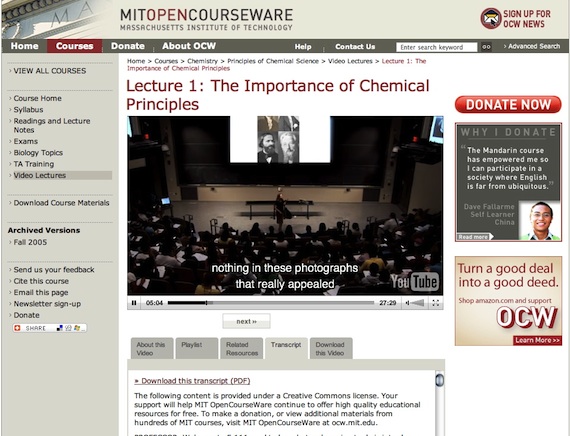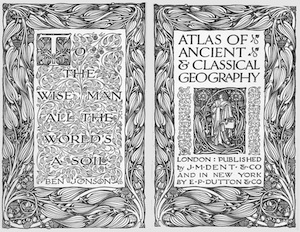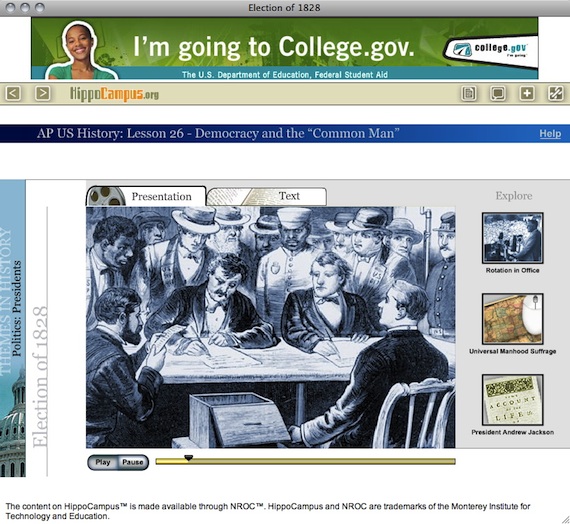Learning Tools | Spotlight
3 Free Resources To Enhance Teaching and Learning
Quality educational resources don't have to be expensive. Here we spotlight three academic gems that can help teachers either enhance instruction in the classroom or extend learning into students' homes, all without any out-of-pocket expenses.
1. MIT's Highlights for High School
As part of its OpenCourseWare (OCW) initiative, Massachusetts Institute of Technology provides a vast wealth of free resources for secondary students and educators, with videos of lectures; teaching materials; study aids and exam preparation; labs; and competitions. Topics are heavily slanted toward science and math--from biology and chemistry to calculus and physics--but also cover the music, visual arts, literature, composition, and even physical education.

From the first lecture in the Principles of Chemical Science undergraduate course. |
Online lectures are delivered by MIT's faculty and span entire semesters, providing complete courses on all topics covers. Video lectures are close-captioned, with additional textual transcripts provided to allow students to follow along. (Transcripts can also be downloaded in PDF format.)
The site also includes supplemental resources like lecture notes, assignments, multimedia galleries, image galleries, and even complete online textbooks.
All told, there are more than 2,000 courses available online--free of charge--through MIT's OCW initiative.
Highlights for High School can be accessed here.
2. Project Gutenberg
Project Gutenberg provides thousands of complete texts that are both free of charge and free of usage restrictions. In fact, this self-described "granddaddy of all e-book libraries" just this year brought its grand total to more than 100,000 books, including more than 40,000 produced by the project's leaders and volunteer staff of transcriptionists and editors.

Cover art from the Atlas of Ancient & Classical Geography on the Project Gutenberg site. |
Unlike many other online repositories, Project Gutenberg isn't limited just to primary and "classic" texts like Milton's Paradise Lost or Chaucer's Canterbury Tales or the complete works of Shakespeare, though of course it does offer those. It also includes periodicals and textbooks covering a range of subjects--astronomy, mathematics, visual arts, music--as well as encyclopedias, atlases, biographies, music collections (notation and MIDI files), and histories, among others.
Project Gutenberg electronic texts are available without cost for viewing through a Web browser and on electronic book readers like Amazon Kindle and mobile devices like iOS- and Android-based tablets and phones. Texts can also be downloaded and read offline. Books are often available in HTML, PDF, EPUB, Kindle, and plain text formats (and other formats) with and without images.
All 100,000 books and periodicals can be accessed via computer or mobile device here.
3. HippoCampus
HippoCampus, from the Monterey Institute for Technology and Education (MITE), is an online repository of distance education courses for secondary teachers and students. It includes standard courses and courses designed for AP students in subjects covering math, science, and social studies (including psychology and United States history).

From AP U.S. History I on MITE's HippoCampus site. |
Content for the courses was developed by college and university faculty and donated to the National Repository of Online Courses, which is also operated by MITE.
Courses include narrated slideshows, presentation texts (for accessibility), maps, articles, biographies, questions related to the current lesson or chapter, math problems, simulations, and other resources.
The site also provides assignments and activities (such as labeling maps), key terms, course objectives, syllabi, chapter tests, and answer keys, among other tools. And, in addition to course access for instructors, the Hippocampus site allows educators to set up custom pages for their students.
HippoCampus can be accessed here.